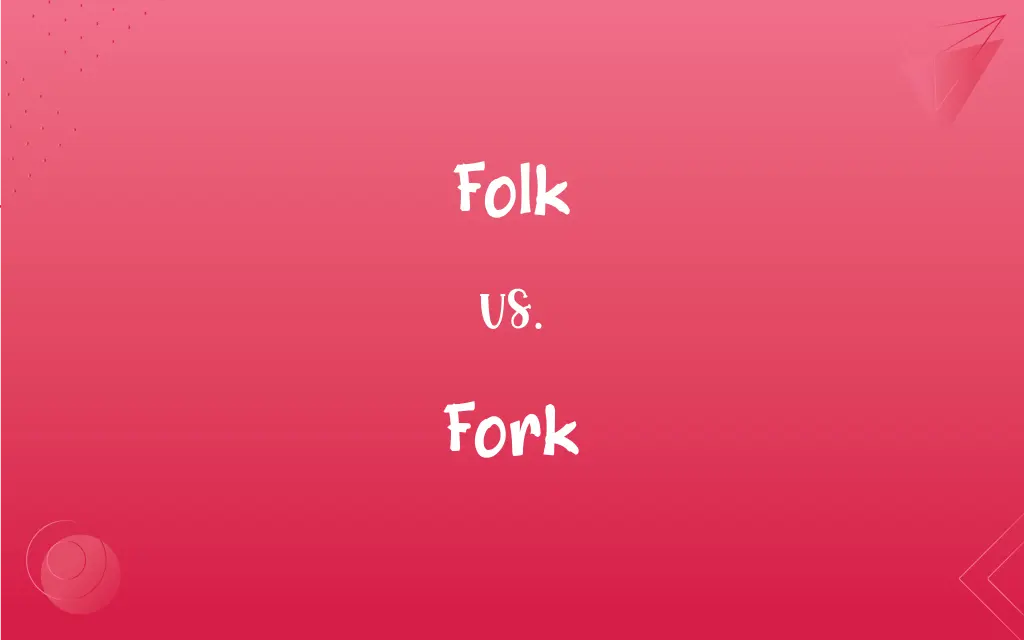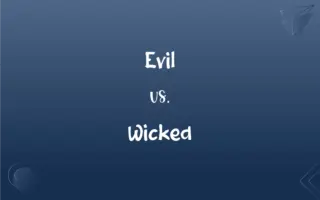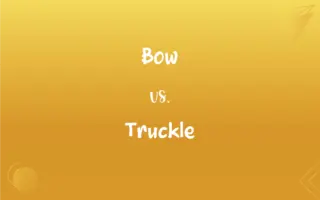Folk vs. Fork: What's the Difference?
Edited by Aimie Carlson || By Harlon Moss || Updated on November 2, 2023
Folk refers to people, especially those of a particular group or region, while fork is a utensil with two or more prongs used for eating or serving food.

Key Differences
Folk encompasses people or a type of traditional culture, as in "folk music," which is rooted in the experiences of common people. A fork, on the other hand, is a utensil with prongs, essential at mealtime for piercing and picking up food.
The term "folk" can also refer to one's relatives, as in "kinfolk" or "my folks back home," indicating a familial group. The fork, as an object, has no such connotations of kinship or cultural heritage, but rather, it is associated with the act of dining and culinary utility.
"Folk" may also carry a collective sense of shared tradition and commonalities within a community or nation, as in "folklore." In stark contrast, a "fork" can be a point of divergence, such as in a road or a decision, symbolizing a split or choice between different paths.
In contemporary use, "folk" has been extended metaphorically to describe a group or type, like "just ordinary folk," emphasizing commonality and simplicity. Conversely, "fork" can describe a division or branching out, not only in physical objects but also in abstract concepts, like "the fork in one’s career path."
"Folk" is often associated with a warm, inclusive sense of community and shared identity. In contrast, "fork," while neutral, has a functional, practical role in everyday life, without emotional or cultural implications, emphasizing its role as a tool rather than a symbol.
ADVERTISEMENT
Comparison Chart
Meaning
Refers to people or cultural traditions
A utensil with prongs for eating or serving
Usage
Descriptive of culture, community, or family
Descriptive of a dining tool or division point
Context
Social, cultural
Culinary, directional
Connotation
Communal, traditional
Practical, utilitarian
Morphology
Unchanged in plural form (folk)
Changes in plural form (forks)
ADVERTISEMENT
Folk and Fork Definitions
Folk
Relating to the traditional art or culture of a community or nation.
She has a vast collection of folk art from her travels.
Fork
A utensil with two or more prongs used for eating.
She twirled her spaghetti with a fork.
Folk
A specific group of people related by blood or marriage.
All my folk come from the Midwest.
Fork
To divide into branches or split.
The lightning caused the tree to fork.
Folk
Informal term for parents.
I'm visiting my folk this weekend.
Fork
A place where something divides into branches.
He stood at the fork in the road, unsure of which path to take.
Folk
People in general.
The festival was a celebration of the local folk and their crafts.
Fork
To deliver or pay out money.
They had to fork over a hefty fine for the late payment.
Folk
A category of music originating among the common people.
He plays folk guitar with a passion seldom seen.
Fork
In programming, to copy a source code repository.
He decided to fork the open-source project and start his own version.
Folk
The common people of a society or region considered as the representatives of a traditional way of life and especially as the originators or carriers of the customs, beliefs, and arts that make up a distinctive culture
A leader who came from the folk.
Fork
A utensil with two or more prongs, used for eating or serving food.
Folk
(Archaic) A nation; a people.
Fork
An implement with two or more prongs used for raising, carrying, piercing, or digging.
FAQs
What does "folk" refer to in music?
Folk music is a genre that draws on traditional music and themes of a particular culture.
Is a "fork" used in both eating and cooking?
Yes, forks can be used for both eating food and preparing it in cooking.
How many prongs does a typical fork have?
A typical dinner fork has four prongs.
What does "folks" mean when used informally?
Informally, "folks" can refer to one's parents or family.
What does it mean to "fork a project"?
In tech, to fork a project means to create a new project based on the existing source code.
What is a dessert fork?
A dessert fork is a smaller fork used for eating dessert.
What are "folk tales"?
Folk tales are traditional stories passed down through generations orally.
How do you use a salad fork?
A salad fork, typically smaller than a dinner fork, is used to eat salads.
Is "folk" used in any expressions?
Yes, such as "folk wisdom" which refers to common sense or traditional beliefs.
What does it mean to "fork over" something?
It means to hand over or pay money, often reluctantly.
Is there a term "fork-tongued"?
Yes, "fork-tongued" describes someone who is deceitful or speaks lies.
Can "folk" be used to refer to just one person?
No, "folk" is a collective noun referring to a group of people.
Is there a type of fork called a "tuning fork"?
Yes, a tuning fork is a tool used to tune musical instruments.
Does "folk" have different meanings?
Yes, "folk" can mean people in general, specific types of music, culture, or family.
Can "fork" be a verb?
Yes, "fork" can be a verb meaning to divide into branches or to pay out money.
What is a "fish fork"?
A fish fork is a specialized fork with a wider left tine used for eating fish.
Can "folk" refer to ethnic heritage?
Yes, it can denote people of a common heritage or background.
Are the words "folk" and "folks" interchangeable?
"Folk" often refers to people in general or culturally, while "folks" can be more casual or familial.
Do "folk" and "folks" have the same plural form?
"Folk" can be singular or plural, but "folks" is always plural.
Are "folklore" and "folk music" connected?
Yes, both are connected to the traditions and culture of a people.
About Author
Written by
Harlon MossHarlon is a seasoned quality moderator and accomplished content writer for Difference Wiki. An alumnus of the prestigious University of California, he earned his degree in Computer Science. Leveraging his academic background, Harlon brings a meticulous and informed perspective to his work, ensuring content accuracy and excellence.
Edited by
Aimie CarlsonAimie Carlson, holding a master's degree in English literature, is a fervent English language enthusiast. She lends her writing talents to Difference Wiki, a prominent website that specializes in comparisons, offering readers insightful analyses that both captivate and inform.































































